CDBG funds may be used for activities that include, but are not limited to:
- Acquisition of real property
- Relocation and demolition
- Rehabilitation of residential and non-residential structures
- Construction of public facilities and improvements, such as water and sewer facilities, streets, neighborhood centers, and the conversion of school buildings for eligible purposes
- Public services within certain limits.
- Activities relating to energy conservation and renewable energy resources
- Provision of assistance to profit-motivated businesses to carry out economic development and job creation/retention activities
Each activity must meet one of the following national objectives for the program: benefit low- and moderate-income persons, prevention or elimination of slums or blight, or address community development needs having a particular urgency because existing conditions pose a serious and immediate threat to the health or welfare of the community for which other funding is not available.
Generally, the following types of activities are ineligible:
- Acquisition, construction, or reconstruction of buildings for the general conduct of government
- Political activities
- Certain income payments
- Construction of new housing (with some exceptions)
